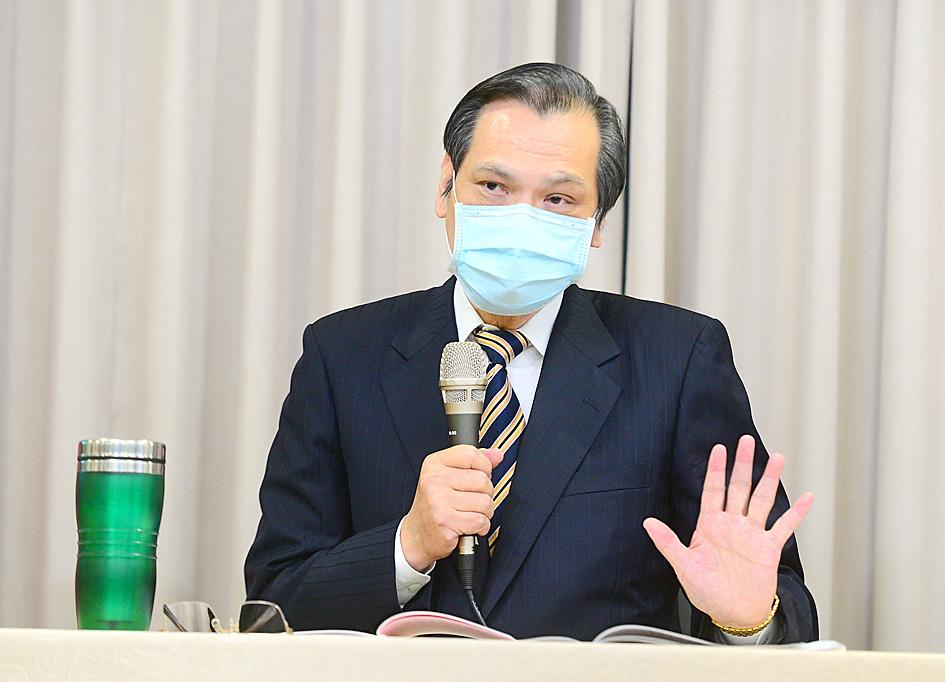The government’s Hong Kong Humanitarian Aid project is to be implemented through a Taiwan-Hong Kong Interaction Office, which is to begin operations on July 1, Mainland Affairs Council (MAC) Minister Chen Ming-tong (陳明通) said yesterday.
The aid plan has been anticipated since China’s National People’s Congress last month endorsed national security legislation for Hong Kong, despite Beijing’s past promise that the territory would remain autonomous until 2047.
The new office is a special agency to assist Hong Kongers with study, investment and entrepreneurial interests, seeking employment or emigrating to Taiwan, Chen told a news briefing in Taipei as he unveiled the government’s plan for helping Hong Kongers.

Photo: Wang Yi-sung, Taipei Times
Established under the Taiwan-Hong Kong Economic and Cultural Cooperation Council, the new office would also assist international companies setting up branches in Taiwan, he added.
The office is to render humanitarian aid to Hong Kongers, while complying with Taiwan’s laws and upholding national security, he said.
The project’s implementation fully embodies the government’s support of Hong Kongers’ efforts to uphold human rights and defend the values of democracy, and its goodwill toward them, he said.
President Tsai Ing-wen (蔡英文) yesterday also reaffirmed her commitment to support Hong Kongers.
Whether reacting to the territory’s extradition bill last year or the national security legislation being imposed by Beijing, Taiwanese have empathized with Hong Kongers’ insistence on freedom and democracy, she wrote on Facebook.
In addition to condemnation of China’s encroachment on Hong Kong’s democracy and human rights, the nation would continue to employ institutional power to provide Hong Kongers with practical support and assistance, she wrote.
After a Chinese academic cited Taipei Mayor Ko Wen-je (柯文哲) as a “pro-unification force,” MAC Deputy Minister Chiu Chui-cheng (邱垂正) said that the council does not respond to the opinions of individuals.
The article, written by Shanghai Institute of Taiwan Studies deputy director Ni Yongjie (倪永杰), urged Beijing to utilize forces in Taiwan that advocate unification and “guide them toward the path of cross-strait negotiations.”
The council calls on the public not to fall into traps set by the Chinese Communist Party, which attempts to expedite unification through means disguised as “democratic negotiations,” Chiu said.
Additional reporting by Chung Li-hua

CHAOS: Iranians took to the streets playing celebratory music after reports of Khamenei’s death on Saturday, while mourners also gathered in Tehran yesterday Iranian Supreme Leader Ayatollah Ali Khamenei was killed in a major attack on Iran launched by Israel and the US, throwing the future of the Islamic republic into doubt and raising the risk of regional instability. Iranian state television and the state-run IRNA news agency announced the 86-year-old’s death early yesterday. US President Donald Trump said it gave Iranians their “greatest chance” to “take back” their country. The announcements came after a joint US and Israeli aerial bombardment that targeted Iranian military and governmental sites. Trump said the “heavy and pinpoint bombing” would continue through the week or as long

TRUST: The KMT said it respected the US’ timing and considerations, and hoped it would continue to honor its commitments to helping Taiwan bolster its defenses and deterrence US President Donald Trump is delaying a multibillion-dollar arms sale to Taiwan to ensure his visit to Beijing is successful, a New York Times report said. The weapons sales package has stalled in the US Department of State, the report said, citing US officials it did not identify. The White House has told agencies not to push forward ahead of Trump’s meeting with Chinese President Xi Jinping (習近平), it said. The two last month held a phone call to discuss trade and geopolitical flashpoints ahead of the summit. Xi raised the Taiwan issue and urged the US to handle arms sales to

BIG SPENDERS: Foreign investors bought the most Taiwan equities since 2005, signaling confidence that an AI boom would continue to benefit chipmakers Taiwan Semiconductor Manufacturing Co’s (TSMC, 台積電) market capitalization swelled to US$2 trillion for the first time following a 4.25 percent rally in its American depositary receipts (ADR) overnight, putting the world’s biggest contract chipmaker sixth on the list of the world’s biggest companies by market capitalization, just behind Amazon.com Inc. The site CompaniesMarketcap.com ranked TSMC ahead of Saudi Aramco and Meta Platforms Inc. The Taiwanese company’s ADRs on Tuesday surged to US$385.75 on the New York Stock Exchange, as strong demand for artificial intelligence (AI) applications led to chip supply constraints and boost revenue growth to record-breaking levels. Each TSMC ADR represents

Pro-democracy media tycoon Jimmy Lai’s (黎智英) fraud conviction and prison sentence were yesterday overturned by a Hong Kong court, in a surprise legal decision that comes soon after Lai was jailed for 20 years on a separate national security charge. Judges Jeremy Poon (潘兆初), Anthea Pang (彭寶琴) and Derek Pang (彭偉昌) said in the judgement that they allowed the appeal from Lai, and another defendant in the case, to proceed, as a lower court judge had “erred.” “The Court of Appeal gave them leave to appeal against their conviction, allowed their appeals, quashed the convictions and set aside the sentences,” the judges